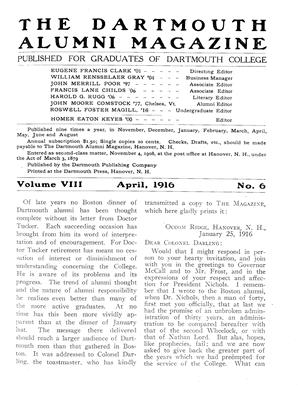In the past it has been said that the College would not support consistently a program series of lecturers and musicians of note. Reasons for this apathy have been ascribed to every characteristic of the College from its democracy to the inaccessibility of its location.
Whatever may be the actual truth of the matter, in the concerts given within the month by Madame SchumannHeink and Hans Ebell, the College at least demonstrated that it was capable of the enjoyment of good music. To be sure, both artists had visited the College before, enabling undergraduates to understand conclusively the value of attendance. In the one case, Webster Hall was crowded to the doors with undergraduates, faculty, townspeople, and neighbors from the surrounding country ; in the other, presumably a smaller affair, the Little Theatre was comfortably filled.
Madame Schumann-Heink's program was deeply appreciated, largely because of the apparent sympathy between herself and those she termed "her boys". Her artistry both in her German and in her English songs was so charming that each particular part of her program received an ovation.
Hans Ebell featured his program with several compositions from modern masters. His technique and brilliancy were remarkable, and his final selection, Shubert's Marche Militaire, was the most popular number of the evening because of its vigor and excellent harmony.
Immediately following the appearance of these two artists, agitation in College for a longer program, to be given under a block ticket next winter, has been started. The Dartmouth advocated the plan editorially in its issue of March 18:
"There is another side to a college education, however, which no amount of such stubborn facts can inculcate. There is a type of very valuable knowledge which must be obtained through a peculiar sort of inspiration not supplied by college professors, no matter how amiable they may be. It is this type which is illustrated rather well by the occasional presentation of unusually gifted musicians and lecturers to the College. It is these occasions which serve to ameliorate to some extent the peculiarly grinding effect of rows of recitations and academic lectures in their never-ending procession. It seems possible that in the increasing development of the College there would be a place for a complete course of lectures and concerts, financed through a block ticket sold impartially to everyone. Certainly this would end any further complaint regarding the sacrifices necessitated by our isolation."
 View Full Issue
View Full Issue
More From This Issue
-
 Article
ArticleANNUAL MEETING OF THE DARTMOUTH SECRETARIES ASSOCIATION
April 1916 By Gray Knapp '12 -
 Article
ArticleTHE SPIRIT AND MECHANISM OF THE ADVISOR SYSTEM
April 1916 By Charles R. Lingley -
 Article
ArticleOf late years no Boston dinner of Dartmouth
April 1916 -
 Article
ArticleCARNIVAL ELICITS COMMENT
April 1916 -
 Article
ArticleTHE WORK OF THE FRESHMAN CLASS OFFICER
April 1916 By Frank A. Updyke -
 Class Notes
Class NotesCLASS OF 1910
April 1916 By Sturgis Pishon
Article
-
 Article
ArticleCOLLEGE NOTES
June, 1915 -
 Article
ArticleNEARLY HALF OF STUDENTS EARN AT DARTMOUTH
APRIL, 1927 -
 Article
ArticleMen of 1942: What Can I Do?
August 1942 -
 Article
ArticleThe Oxford Plan Attacked
JANUARY, 1928 By "F. Clark S. '30." -
 Article
ArticleA President Emeritus Leads a Busy Life
December 1946 By C. E. W. -
 Article
ArticleDartmouth 13, Holy Cross 8
DECEMBER 1963 By DAVE ORR '57

